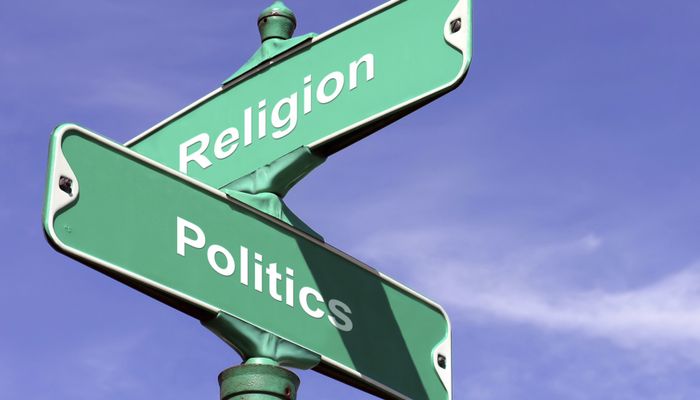It is time to accept that there should be dividing lines between politics and religion, with a level playing field

India 2024 will probably go down as the most bitterly-fought elections till date within the country. What looked like a walkover till a few weeks ago, now turns out rather bitterly contested. This is obvious, even though it won't be too surprising if the incumbent government gets another term in office. The only question is: how?
This week, the Prime Minister pulled no punches by making rather blatant campaigns over religious issues, targeting the Muslim community in particular. Had a party leader made the same allegations, it would have been one thing. But the Prime Minister of a (still) secular republic making the same statements is something quite different. Actually, the highlighting of religion in politics and elections is often just a smoke-screen. In other words, the smokescreen of religion is nothing but a distraction. It helps to ensure we don't all start asking serious questions about economics, misgovernance, the loot of public sector banks, demonetisation, mishandling of the pandemic, the handing over of public assets to private players, crony capitalism, and so much more.
Freedom of religion in India is a fundamental right guaranteed by Article 25-28 of the Constitution of India. The Constitution says India is a secular state. It provides for freedom of conscience and the right of all individuals to profess, practice, and propagate religion freely. This is, of course, subject to considerations of public order, morality, and health. That being the case, how can one section be targeted on the basis of their beliefs or faith?
Christophe Jaffrelot, outspoken French political scientist and Indologist, has argued (carnegieendowment.org) that: "...Political entrepreneurs who promote ethnoreligious identities -- especially Hindu nationalist ideologues -- have created much confusion around the notion of secularism, claiming that its proponents have endeavored to make the state hostile or indifferent to religion. That was certainly not the intention of the architects of modern India, whose enemy was not religion, but communalism."
Section 123(3) of the Representation of the People Act, 1951, says that appeals by a candidate (or any other person with the 'consent of the candidate') to vote or refrain from voting on the ground of his religion, race, caste, community or language is a corrupt electoral practice.
That may be the law on paper. In practice, the mix of communalism in Indian elections has been the bane of our electoral system. In one case, action was taken by the courts against the late Shiv Sena supremo Bal Thackeray, in 1995. But, obviously, much more action is needed.
LiveLaw.in has discussed the issue regarding the Appeal On Ground Of Religion & Use Of Religious Symbols For Votes As 'Corrupt Practice' Under RP Act. This was written by Manu Sebastian in April 2024, this month itself, and is available online as paywalled content.
In the past, parties like the BJP and its predecessor, the Jan Sangh, have argued against "pseudo-secularism" and claimed they were the true secularists. Now, even that pretence has been done away with.
At one stage, the BJP has claimed that it was not against "minorities", but against "minoritism". This, of course, did not convince the voters concerned. Nothing within the law, ethics or fair politics, stops the BJP from stooping to any level. For instance, to claim that the Goa Church has actually called on Catholics in 2024 to vote for that party -- something that couldn't be further from the truth. Likewise, the Cardinal had to respond to the fears that the "minority" voters were being sent out of the State just prior to elections, with a free ticket on the pilgrim train to Vailankanni!
At the same time, digital posters have suddenly surfaced once again, to remind voters about the Prime Minister inviting the Pope on a visit to India, an issue which came up a short while before India went into election year.
Talk has come up about State-funding "for the Exposition" in 2024-25. Or other long pending issues affecting Catholics more than others, such as access to OIC (Overseas Citizen of India) status after opting for Portuguese citizenship, is suddenly getting sorted out in the electoral period itself. If this is not sheer "minoritism" and appealing to religious identities of people, then what is?
While politicians have carved out 'majority' and 'minority' in easy and simplistic ways, the Indian reality is far more complex. The term 'Hindu' traces its origins to Old Persian! It started as an geographical identity. Later on, it became cultural, and finally religious.
Initially, it started out as a geographic, ethnic or cultural identifier for people in the Indian subcontinent around our beyond the Sindhu (Indus) River. This term has evolved in many ways over the centuries. In the eighteenth century, European merchants and colonisers began to refer to the followers of Indian religions collectively as Hindus.
Even today, it is kept ambiguously vague. Politicians will (when convenient) argue that any patriotic Indian can be a Hindu, regardless of their religion. They will sometimes point to some court judgement which calls Hinduism "a way of life".
But if some Indians can be criticised, ridiculed and disenfranchised, then tomorrow it could well be the turn of others. Ironically enough, almost everyone is quick to take umbrage when they see people of another religion making a political comment. For instance, Fr Bolmax's recent comment on Shivaji, the FIR against which was overturned by the courts. Catholic priests and their supporters will defend themselves, by pointing out that a Hindu cleric (often dressed in full religious garb) is the chief minister of India's largest State.
It is time to accept that there should be dividing lines between politics and religion, that we should all accept a level playing field, and that manipulating people's religious feelings and communal biases is definitely something not good for a country as plural and diverse as India.